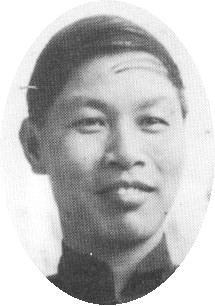Related Research Articles

Watchman Nee, Ni Tuosheng, or Nee T'o-sheng, was a Chinese church leader and Christian teacher who worked in China during the 20th century. His evangelism was influenced by the Plymouth Brethren.

William Marrion Branham was an American Christian minister and faith healer who initiated the post-World War II healing revival, and claimed to be a prophet with the anointing of Elijah, who had come to prelude Christ's second coming; some of his followers have been labeled a "doomsday cult". He is credited as "a principal architect of restorationist thought" for charismatics by some Christian historians, and has been called the "leading individual in the Second Wave of Pentecostalism." He made a lasting influence on televangelism and the modern charismatic movement, and his "stage presence remains a legend unparalleled in the history of the Charismatic movement". At the time they were held, Branham's inter-denominational meetings were the largest religious meetings ever held in some American cities. Branham was the first American deliverance minister to successfully campaign in Europe; his ministry reached global audiences with major campaigns held in North America, Europe, Africa, and India.

Yiguandao / I-Kuan Tao (traditional Chinese: 一貫道; simplified Chinese: 一贯道; pinyin: Yīguàn Dào; Wade–Giles: I1-Kuan4 Tao4), meaning the Consistent Way or Persistent Way, is a Chinese salvationist religious sect that emerged in the late 19th century, in Shandong, to become China's most important redemptive society in the 1930s and 1940s, especially during the Japanese invasion. In the 1930s, Yiguandao spread rapidly throughout China led by Zhang Tianran, who is the eighteenth patriarch of the Latter Far East Tao Lineage, and Sun Suzhen, the first matriarch of the Lineage.
The White Lotus Rebellion was a rebellion initiated by followers of the White Lotus movement during the Qing dynasty of China. Motivated by millenarian Buddhists who promised the immediate return of the Buddha, it erupted out of social and economic discontent in the impoverished provinces of Hubei, Shaanxi, and Sichuan. The rebellion began in 1794, when large groups of rebels claiming White Lotus affiliations rose up within the mountainous region that separated Sichuan province from Hubei and Shaanxi provinces. A smaller precursor to the main rebellion broke out in 1774, under the leadership of the martial-arts and herbal-healing expert Wang Lun in Shandong province of northern China.

The Red Turban Rebellions were uprisings against the Yuan dynasty between 1351 and 1368, eventually leading to its collapse. Remnants of the Yuan imperial court retreated northwards and is thereafter known as the Northern Yuan in historiography.

Li Jing, originally Xu Jingtong (徐景通), briefly Xu Jing (徐璟) in 937–939, courtesy name Boyu (伯玉), also known by his temple name as the Emperor Yuanzong of Southern Tang (南唐元宗), also known in historiography as the Middle Lord of Southern Tang (南唐中主), was the second and penultimate monarch of China's Southern Tang dynasty during the Five Dynasties and Ten Kingdoms period. He reigned his state from 943 until his death.

The Church of Almighty God, also known as Eastern Lightning, is a monotheistic new religious movement which was established in China in 1991. Government sources estimate the group has three to four million members.
The application of the labels "cults" or "sects" to religious movements in government documents usually signifies the popular and negative use of the term "cult" in English and a functionally similar use of words translated as "sect" in several European languages. Government reports which have used these words include ones from Austria, Belgium, Canada, China, France, Germany, and Russia. While these documents utilize similar terminology they do not necessarily include the same groups nor is their assessment of these groups based on agreed criteria. Other governments and world bodies also report on new religious movements but do not use these terms to describe them.
Liu Xun, courtesy name Zitai, was a military general and minor warlord who lived during the late Eastern Han dynasty of China.
Shang Rang (尚讓) was a major follower of Huang Chao, an agrarian rebel leader against the rule of the Chinese Tang dynasty and carried prominent titles after Huang declared himself the emperor of a new state of Qi. As Huang neared defeat in 884, Shang turned against him and submitted to the Tang general Shi Pu and participated in the final destruction of Huang's army. Shang himself was later killed by Shi.
The Shouters, or more properly the Shouters sect (呼喊派), is a label attached by the People's Republic of China (PRC) to an amorphous group within China that was targeted by the government first as counterrevolutionaries and subsequently as a criminal cult after incidents in Dongyang and Yiwu counties in Zhejiang province in February 1982. "The Shouters sect" became the object of waves of arrests in 1983 and again in 1995. Several 1983 publications with ties to the Three-Self Patriotic Movement (TSPM) accused the late expatriate Chinese Christian teacher Witness Lee of being the leader of "the Shouters sect" and of instigating the disorders. In practice, however, the appellation "the Shouters sect" has been applied far more broadly to many groups that pray openly and audibly and/or do not register or otherwise cooperate with the TSPM. There is considerable reason to doubt the veracity of the reports which led to the condemnation of "the Shouters sect" and the association of them with Witness Lee or the local churches, and the local churches distance themselves from the Shouters.
The Anointed King / Beili Wang (被立王) is a new religious movement of Christian origin in the People's Republic of China, which possibly had more than 100,000 members at its peak.

The Mentuhui, also known as the Three-Redemptive Christ sect, is a Christian doomsday new religious movement in China.
Spirit Church, also known as Efficacious Spirit Teachings, is a new religious movement from China. It was founded in the 1980s, in Hunan by Hua Xuehe (华雪和), a primary school teacher with high school education from Jiangsu. Hua was a member of the Chinese Communist Party who became a Protestant in 1978 and joined the True Jesus Church in 1979. In 1982, he left the True Jesus Church and established his own movement.
Tian Jun, courtesy name Dechen (德臣), was a Chinese military general, politician, and warlord during the late medieval Tang dynasty, who ruled Ningguo Circuit at its military governor (jiedushi) from 892 to his death in 903. He was a childhood friend of the major warlord Yang Xingmi the military governor of Huainan Circuit, served under Yang during various campaigns, and continued to be Yang's vassal after he became a military governor. However, he eventually became angry at Yang's refusal to support him in his own campaigns of expansion. In 903, he rebelled against Yang in conjunction with An Renyi (安仁義) the military prefect of Run Prefecture and, for some time, posed a major threat to Yang's continued rule of Huainan, but was soon defeated by Yang's officer Tai Meng (臺濛) and killed in battle.
Sanban puren pai is a Christian doomsday sect in China. The group was founded in Henan by Xu Wenku who claimed to be the "Great Servant" 大仆人 in the 1990s.
The Way of the Gods according to the Confucian Tradition, also called the Luandao or Luanism or—from the name of its cell congregations—the phoenix halls or phoenix churches, is a Confucian congregational religious movement of the Chinese traditional beliefs.

Remnant fellowships are a loosely organized branch of the Latter Day Saint movement formed by individuals who accept alleged divine revelations received by Denver Snuffer Jr.. The Remnant Fellowships generally feel called to personal and social renewal preparatory to Christ's eventual second coming. According to movement beliefs, participants anticipate a coming time when remnants remain within the full restored covenant with Jesus Christ: an allusion to a belief that "The Bible, Book of Mormon, and modern revelation through the Prophet Joseph Smith, prophesy that the gospel of Jesus Christ would shift from the Gentile stewards of the gospel back to Israel in the last days." The movement places a renewed focus on individual communion with God, gifts of the spirit, tangible expressions of faith, and the eventual establishment of Zion. While the movement has no official name, the term "Snufferite" has been used to denote followers. Other designations include covenant of Christ movement and Denver Snuffer movement. Participants sometimes reference each other as "covenant Brother," "covenant Sister".
Heterodox teaching is a concept in the law of the People's Republic of China (PRC) and its administration regarding new religious movements and their suppression. Also translated as 'cults' or 'evil religions', "heterodox teachings" are defined in Chinese law as organizations and religious movements that either fraudulently use religion to carry out other illegal activities, deify their leaders, spread "superstition" to confuse or deceive the public, or "disturb the social order" by harming people's lives or property.
References
- 1 2 3 4 5 6 Dunn, Emily (2015). Lightning from the East: Heterodoxy and Christianity in Contemporary China. Brill. pp. 34–35. ISBN 978-90-04-29724-1.
- 1 2 3 4 5 6 "Zhushenjiao" (PDF). Chinapolitik.de. Archived from the original (PDF) on 12 October 2013. Retrieved 7 December 2014.
- ↑ "Yangmin". World News. Retrieved 7 December 2014..
- ↑ Jiang An (江岸) and Zhang Shiping (张世平), “主神教’覆灭 记” (A history of the suppression of the "Lord God’s Teaching"), 中国宗教, 1 (1999), 1–7.
- 1 2 Seth Faison (18 September 1999). "Strategy for a Charlatan in China: Claim Deity, Then Steal and Seduce". New York Times. Retrieved 6 January 2020.
- ↑ China Gospel Fellowship, 防备辩驳异端 (Beware and Refute Heresy), Zhengzhou: China Gospel Fellowship, undated (ca. 2004), 120-121.